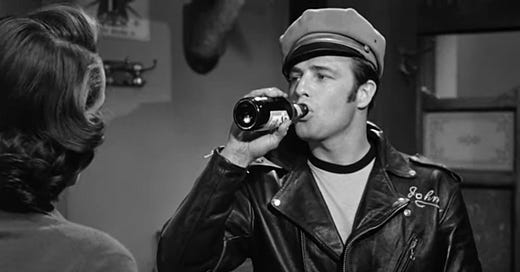Andrew Tate and the lost boys
Has our nervousness about masculinity left us unable to talk to boys about what it means to be a man?
In the first preview of one of this year's Battle of Ideas festival panels, Ella Whelan discusses the broader implications of the Andrew Tate phenomenon.
From bad influences to rebels without a cause, society has always worried about young men. But the recent popularity of influencer and self-titled ‘king of toxic masculinity’, Andrew Tate, among young men - and even pre-teen boys - has left schools and parents in a panic. Such is the fear of Tate’s influence that headteachers have reached out to the Department for Education for guidance on how to talk to their lads about his misogynistic views on women. During Prime Ministers’ Questions, Rishi Sunak was asked how schools should ‘tackle pupils being brainwashed by Tate’. Thanks to his ‘misogynistic’ posts, Tate’s social-media feeds have been wiped out - he is banned from YouTube, Facebook, Instagram and TikTok.
Despite being charged with human trafficking, rape and forming a criminal gang to sexually exploit women alongside his brother, Tate’s appeal seems to live on. Have all our young men turned into make-me-a-sandwich misogynists? Not quite - the Tate phenomenon is complicated. Many young men claim to take his messages about women with a bucket of salt, instead finding meaning in his proselytising about ambition, self-sufficiency and becoming ‘a man’. In an interview with the BBC about her work in PHSE lessons in Northern Ireland, one teacher claimed that ‘a lot of the boys can see that there’s parts of Andrew Tate that they respect and admire, and then there’s parts that they don’t’.
Aside from the flashy cars and big cigars, the real appeal of Tate seems to lie in the fact that he openly talks about what it means to be a man, even if his vision is flawed. He is not alone in seeing a gap in the market - in fact, almost everyone now agrees that we need to talk about men. Campaigns about male mental health, wellbeing and happiness now proliferate. Caitlin Moran, the queen of how-tos on womanhood, has even penned a new guide, What About Men? But despite the fact that we’re all now willing to talk about the boys, the question is, why do we seem to be getting it so wrong?
Some argue that contemporary feminist discussions about young women - from ‘He for She’ campaigns to the fallout from the #MeToo movement - can seem to put boys down in order to raise girls up. In the world of dating and relationships, young men now get mixed messages. While being expected to make the first move by young women hoping for romance, consent classes and PHSE lessons have drummed into them that any move without consent is immoral. It’s not hard to see the correlation between an interest in ‘incel’ (involuntary celibate) trends online and a feeling among young men that they are constantly under suspicion. Others argue that the contemporary condemnation of ‘toxic masculinity’ has eliminated any discussion about what a ‘positive’ masculinity might look like, leaving boys to turn to online figures to find out how to grow up.
On the other hand, the kind of sexist views that Tate promotes are not alien to young women. Indeed, Tate is merely the latest in a long line of ‘pick-up artists’ who coach young men to conquer what they see as silly girls. If taking on and taking down the likes of Tate or Julien Blanc (who was banned from entering the UK in 2014) causes a crisis in masculinity, they argue, so be it. Not only are ‘traditional values’ of masculinity harmful to women, but critics argue that they’re also harmful to men. In 2019, the American Psychological Association (APA) made headlines by publishing new ‘first-ever guidelines for practice with men and boys’. The APA suggested that we needed to ‘focus on supporting men in breaking free of masculinity rules that don’t help them’. Instead, men should be encouraged to see themselves as ‘adaptable, emotional and capable of engaging fully outside of rigid norms’.
Has our nervousness about masculinity left us unable to talk to boys about what it means to be a man? Does the popularity of Tate and other influencers prove that sexism is still a problem, or should we be more concerned that large numbers of boys are turning to strangers online for life guidance? Are we dealing with a generation of lost boys, or is this crisis in manhood simply a twenty-first century version of the Johnny Strabler effect? What are you rebelling against? What have you got?
‘Andrew Tate and the lost boys’ is just one of the debates taking place at this year’s Battle of Ideas festival on the weekend of 28 & 29 October. Join us for a weekend of public discussion, to untangle the political challenges we face today. You can get discounts on festival tickets by becoming a paid subscriber to this Substack.






The article is ok but missing some details and falls too easily into calling Tate a misogynist and not acknowledging women’s active role and self interest in working for Tate or seeking men like Tate as partners.
Tate may be charged with serious crimes, but his version was not explained. He defends himself by stating the women willingly worked on sex lines and knew what they were doing and earned good money. Some women find his type of alpha male very attractive and are prepared to be one of his multiple sex partners. Tate and other men find this proposing attractive, indeed, most male sexual fantasies comprise of having multiple willing sexual partners. Don’t blame Tate, blame evolution. Some women are keen on this arrangement to get better resources than other women even if the feminist sisterhood don’t approve.
However, this is not good for society in general and haven’t the sisterhood helped us get here. Men are undervalued. If girls surpass boys at school it is celebrating but not the other way round. So, sisters, admit you have some responsibility and some of your group use short term mating tactics and like the male attention in cling high paid sex work or sleeping only with the high status males wit nice cars. Perhaps you spent too much time blaming men for evolution and didn’t encourage men and women to curb their baser instincts for the good of all. The word misogynist trips off the tongue and means men like Tate and others are blamed and branded toxic. Easy moral pints to score but shouldn’t we all value men and women?